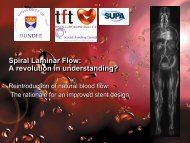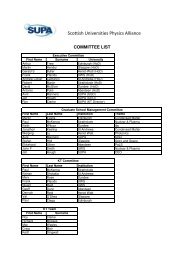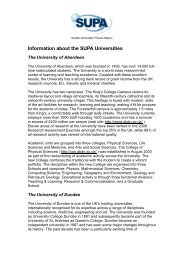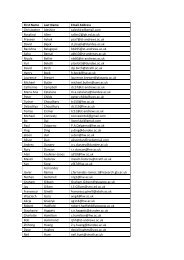Catalogue of Courses & Student Handbook - SUPA
Catalogue of Courses & Student Handbook - SUPA
Catalogue of Courses & Student Handbook - SUPA
Create successful ePaper yourself
Turn your PDF publications into a flip-book with our unique Google optimized e-Paper software.
Condensed Matter and Material Physics<br />
Advanced Condensed Matter (<strong>SUPA</strong>ACM)<br />
Lecturer: Santiago Grigera<br />
Institution: St Andrews<br />
Hours Equivalent Credit: 15<br />
Assessment: Problem Sheets<br />
Course Description<br />
This course aims to cover some <strong>of</strong> the more advanced concepts in<br />
condensed matter physics. An introductory section deals with materials,<br />
energies, potentials, and structures (including fractal structures and<br />
glasses as well as conventional periodic crystals). This is followed by<br />
discussion <strong>of</strong> defects and excitations; low-dimensional systems, and<br />
magnetism and frustration. The course closes with some analysis <strong>of</strong><br />
experimental results on real metals, including the heavy-fermion<br />
compounds. The emphasis throughout is on rigorous understanding <strong>of</strong><br />
the general principles <strong>of</strong> symmetry, energy, and topology that determine<br />
the behaviour <strong>of</strong> real-world condensed matter systems.<br />
MBQT 1a (Quantum Field Theory Light) (<strong>SUPA</strong>FTL)<br />
Lecturer: Chris Hooley<br />
Institution: St Andrews<br />
Hours Equivalent Credit: 20 (including 5 whole class tutorials)<br />
Assessment: Problem Sheets<br />
This course comprises a subset <strong>of</strong> lectures from the complete<br />
<strong>SUPA</strong>QFT course and is a core course for DTC students undertaking<br />
an experimental research (rather than theoretical research) PhD.<br />
Course Description<br />
The topics covered will include: quantisation <strong>of</strong> field theories by analogy<br />
to quantisation <strong>of</strong> harmonic oscillators, chains <strong>of</strong> harmonic oscillators<br />
and the continuum limit. Feynman path integrals for propagators and<br />
thermal averages. Many body field theory and second quantisation,<br />
2nd quantised operators and bookkeeping. Harmonic theories and<br />
Unitary/Bogoliubov transformations – theory <strong>of</strong> superconductors and<br />
Bose Einstein Condensates. Interacting spins and quantum magnetism,<br />
bosonic (spin-wave) representations <strong>of</strong> spins.<br />
Please note that this course is a prerequisite for <strong>SUPA</strong>MAG, <strong>SUPA</strong>SUP,<br />
<strong>SUPA</strong>RFN (Many-body Quantum Theory 2), <strong>SUPA</strong>QPT (Many-body<br />
Quantum Theory 3). This course is an antirequisite <strong>of</strong> <strong>SUPA</strong>QFT.<br />
Semester 2<br />
MBQT 2 (Response Functions) (<strong>SUPA</strong>RFN)<br />
Lecturer: Chris Hooley<br />
Institution: St Andrews<br />
Hours Equivalent Credit: 13<br />
Assessment: Continuous Assessment<br />
Course Description<br />
Response functions and Green’s functions provide a powerful<br />
mathematical language in which to describe the physics <strong>of</strong> manybody<br />
quantum systems. This course is a short introduction to them.<br />
The first few lectures define the various Green’s functions <strong>of</strong> interest,<br />
and calculate them explicitly for a few very simple systems at zero<br />
temperature. The remaining lectures give brief introductions to several<br />
more advanced topics, including Green’s functions at non-zero<br />
temperature and Green’s functions out <strong>of</strong> equilibrium. The lectures are<br />
supplemented by several problem sheets, in which the emphasis is on<br />
a strong grasp <strong>of</strong> the basics. The course is designed to be accessible<br />
to any graduate student (theoretical or experimental) who has a decent<br />
undergraduate education in quantum mechanics. Some - though not<br />
much - knowledge <strong>of</strong> the formalism <strong>of</strong> second quantisation (creation<br />
and annihilation operators) is required.<br />
Experimental Nanophysics (<strong>SUPA</strong>ENP)<br />
Lecturer: Brian Gerardot<br />
Institution: Heriot-Watt<br />
Hours Equivalent Credit: 24<br />
Assessment: Continuous Assessment<br />
This is a final year undergraduate course organised by Heriot-Watt<br />
University.<br />
Course Description<br />
This course will focus on the emerging techniques and ideas <strong>of</strong><br />
nanophysics where the small size <strong>of</strong> systems plays a crucial role in<br />
determining their properties and behaviours. The fundamental aim is<br />
to provide the students with a working knowledge <strong>of</strong> contemporary<br />
nanophysics. The course explains how such structures can be<br />
fabricated, characterized, manipulated and understood. The focus is<br />
on the quantum aspects <strong>of</strong> the behaviour, properties not shared with<br />
more conventional condensed matter systems. The course will cover<br />
quantisation effects, fabrication <strong>of</strong> nanostructures, optical and electron<br />
microscopy, scanning tunnelling and atomic force microscopy, and<br />
quantum dots. On completion <strong>of</strong> this course, the learner will be able to:<br />
achieve a critical knowledge and understanding <strong>of</strong> nano-scale devices,<br />
their fabrication and characterization; demonstrate a detailed knowledge<br />
and understanding <strong>of</strong> advanced concepts and applications in the<br />
nano-scale regime; integrate previous knowledge from physics courses<br />
with the topics discussed in the module; analyse advanced problems in<br />
nanophysics.<br />
Magnetism (<strong>SUPA</strong>MAG)<br />
Lecturer: Chris Hooley<br />
Institution: St Andrews / Edinburgh<br />
Hours Equivalent Credit: 20<br />
Assessment: Continuous Assessment<br />
For information only. This course is biennial and will not run in 2013/14.<br />
It will run again in 2014/15.<br />
Course Description<br />
This course deals with the theory <strong>of</strong> the origins, properties,<br />
and measurement <strong>of</strong> magnetism in condensed matter systems.<br />
Elementary models <strong>of</strong> magnetic response; Bohr-van Leeuwen theorem,<br />
diamagnetism and paramagnetism; Landau theory <strong>of</strong> ferromagnetism,<br />
symmetry breaking; exchange interactions; the Heisenberg model and<br />
spin wave theory; magnetic frustration; crystal fields; magnetic ordering<br />
in insulators and metals; giant magnetoresistance and experimental<br />
techniques.<br />
14







